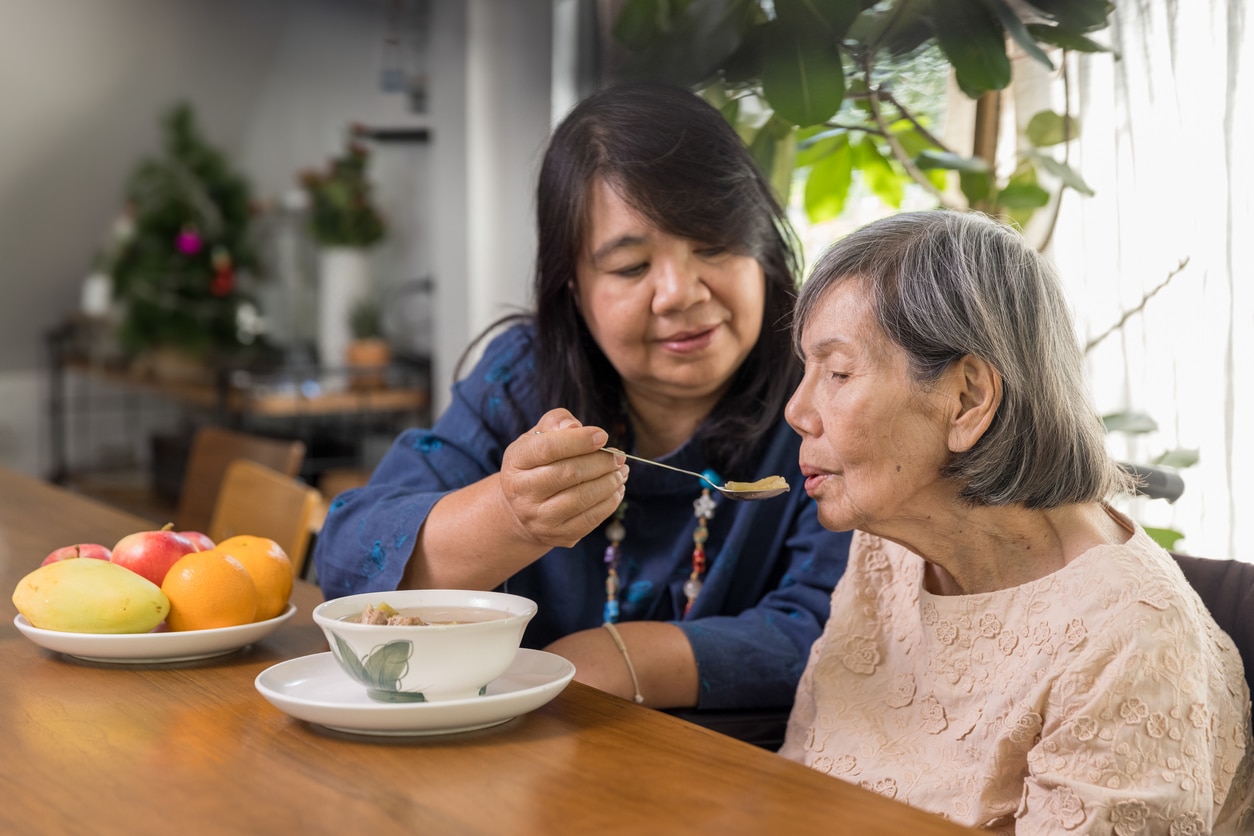It may not be obvious but many seniors find eating regular nutritious meals more and more difficult as they age. Not only is it harder for older adults to shop, carry and put away groceries, but cooking can become a challenge and health problems can interfere with eating to the point that it may be painful, or even dangerous. If you believe a beloved senior isn’t eating well, take a look at what experts advise to help get them back on track.
Understand the reasons aging parents struggle with meals
If you suspect a senior isn’t eating as much or as often as they should, understanding why is key to finding a solution. One reason is loss of appetite, which is not uncommon among older adults. According to the dailycaring.com article, “10 Reasons Why Seniors Lose Their Appetite,” some of the reasons are simple and easy to fix.
For example, if they are having trouble getting to the grocery store offer to take them, shop for them or arrange for delivery. Other simple changes that can help encourage eating well include reminding them to drink water regularly to stave off dehydration which can decrease appetite, creating a daily routine that includes meals at the same time, and helping them to get more exercise which can increase hunger and help with mobility and overall strength and stamina as well.
But aging also has other inherent threats to eating well that may require help from a physician and/or dentist. According to the geriatricdietician.com blog, “Elderly Not Eating: Aging and Appetite,” the possibilities may include:
- Loss of taste or smell.
- Problems swallowing.
- Painful teeth or gums.
- Medication side effects like loss of appetite or nausea.
- Loneliness or depression.
- Memory problems.
- Diseases and conditions that make eating difficult or decrease appetite.
Thorough exams by a physician and a dentist can often reveal the problem or problems and ways to address them so eating well is easier and more enjoyable.
Increase engagement with meals
Seniors living at home alone often suffer from isolation and loneliness which in turn can cause depression, anxiety and myriad other health problems including poor nutrition and loss of appetite. But the National Institute on Aging article, “Loneliness and Social Isolation — Tips for Staying Connected,” notes that there are many ways seniors can break out of isolation with just a little help. Families can get involved by arranging regular in-person visits, phone calls or video chats, making a special effort to include seniors in family events and outings (including providing transportation), joining them for meals more often, taking them to local senior centers or community classes that interest them, and assisting them with getting outdoors for exercise, fresh air and sunshine.
Another option is to discuss a move to senior living where there are plenty of opportunities for socialization and meals are fun daily events that are not only nutritious but present the opportunity to spend time with friends and neighbors in a convivial community setting.
Memory problems and eating well
Memory problems can be especially difficult when it comes to ensuring a senior loved one is eating well. According to the medicalnewstoday.com article, “How does dementia affect a person’s appetite?” one study showed more than 80% of Alzheimer’s disease patients exhibited problems eating and swallowing, compared to just 26.7% of normal seniors. Other problems may include choking, coughing, refusing to swallow, and spitting out food which can further exacerbate the problem.
Many seniors with dementia or Alzheimer’s disease may literally forget to eat or require hands-on help at each meal to ensure they eat enough. Again, however, there are ways to make mealtime easier and more successful as noted in the alz.org article, “Food and Eating.” Start by creating a calm atmosphere at mealtimes by turning off televisions and limiting other distractions and setting aside enough time so the senior isn’t rushed, generally at least an hour. To avoid confusion, keep place settings simple and offer one food at a time, taking care to cool hot foods before serving. Also, remember to provide plenty of fluids throughout the day as well as small healthy snacks to supplement nutrition.
Needless to say, it’s a full-time job to keep seniors with memory problems healthy and well-fed, which is where memory care can be a great alternative to home care. In top memory care communities like Ganton’s Countryside, residents are not only well-fed, safe and secure, they enjoy plenty of socialization and fun activities designed to improve their quality of life and encourage independence.
Ganton’s Countryside Senior Living makes good nutrition a primary part of a well-rounded lifestyle. For more information about Countryside, please call Margaret Nagel at (517) 206-5000 or download our brochure to learn about our care levels, cost, and amenities.


